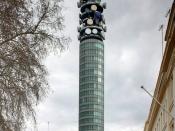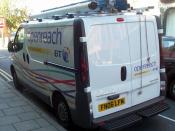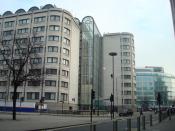Businesses of BTBritish Telecommunications plc (BT) is a wholly-owned subsidiary of BT Group plc and encompasses virtually all businesses and assets of the BT Group. BT Group plc is listed on stock exchanges in London and New York.
BT runs the telephone exchanges, trunk network and local loop connections for the vast majority of British fixed-line telephones. Currently BT is responsible for approximately 28 million telephone lines in the UK. Apart from Kingston Communications, which serves Kingston-upon-Hull, BT is the only UK telecoms operator to have a Universal Service Obligation (USO) which means it must provide a fixed telephone line to any address in the UK. It is also obliged to provide public call boxes.
BT's businesses are operated under special government regulation by the British telecoms regulator Ofcom (formerly Oftel). BT has been found to have Significant Market Power in some markets following Market Reviews by Ofcom. In these markets, BT is required to comply with additional obligations such as meeting reasonable requests to supply services and not to discriminate.
As well as continuing to provide service in those traditional areas in which BT has an obligation to provide services or is closely regulated, BT has expanded into more profitable products and services where there is less regulation. These are principally, broadband internet service and bespoke solutions in telecommunications and information technology.
BT Group is organised into the following business divisions:BT Retail: Retail telecoms to consumersBT Wholesale: Wholesale telecoms core trunk networkOpenreach: fenced-off wholesale division, tasked with ensuring that all rival operators have equality of access to BT's own local networkBT Global Services: Business services and solutions (formerly BT Ignite and BT Syntegra)BT Exact / One IT: consultancy and internal IT. There is some overlap with BT Global Services. R&D functions are no longer handled by BT Exact.
Group operations: handles security, research and development, and other functions for BT Group Plc such as legal servicesFrom 1 July 2007 two additional divisions will be put in place:-BT Operate will take responsibility from BT Wholesale for the roll-out and maintenance of the group's new IP based fixed-line network, known as 21st Century Network (21C).
BT Design will pull together IT designers from BT Retail, BT Wholesale and BT Global Services and OneIT to design services on the 21C network.
BT's attempted global alliancesMCIIn June 1994 BT and MCI launched Concert Communications Services which was a $1 billion joint venture between the two companies. Its aim was to build a network which would provide easy global connectivity to multinational corporations.
This alliance progressed further on 3 November 1996 when the two companies announcement that they had entered into a full merger agreement to create a global telecommunications company to be called Concert plc, which would be incorporated in the UK with headquarters in both London and Washington DC. This would have given BT an entry into the US market and MCI a global reach. The merger proposition gained approval from the European Commission, the US Department of Justice and the US Federal Communications Commission and looked set to proceed.
However, in light of pressure from investors reacting to the slide in BT's share price on the London Stock Exchange, BT reduced its bid price for MCI, releasing MCI from its exclusivity clause and allowing it to speak to other interested parties. On 1 October 1997, Worldcom made a rival bid for MCI which was followed by a counter-bid from GTE. Because MCI used its stock to leverage its purchase, as opposed to cash (used by BT), it was able to outbid BT. MCI accepted the Worldcom bid and BT pulled out of its deal with a generous severance fee of $465 million.
BT made even more money when it sold its stake in MCI to Worldcom in 1998 for ã4,159 million on which it made an exceptional pre-tax profit of ã1,133 million. This was advised by corporate bankers, who saw the early signs of WorldCom's collapse[citation needed]. As part of the deal, BT also bought out from MCI its 24.9% interest in Concert Communications, thereby making Concert a wholly-owned part of BT.
The reaction to the failure of the deal in the City of London was critical to the future of then Chairman Iain Vallance and CEO Peter Bonfield, and the lack of confidence from the failed merger would ultimately lead to their removal.
AT&TAs BT now owned Concert, and still wanted access to the North American market, it needed a new partner. An AT&T/BT option had been mooted in the past, but stopped on regulatory grounds due to their individual virtual monopolies in their home markets. By 1996, this had receded to the point where a deal was possible. However, the former monopolies clashed in management and culture - and the alliance never really worked from the start. Also, during the proposed MCI merger position, BT/MCI had placed a series of nominated customers inside Concert to overcome regulatory issues, leaving Concert with a sales force. On merger with AT&T, it was reversion to delivery of a series of Global products, and two competing owners - which robbed Concert of revenues and left its management disillusioned.
At its height, the Concert managed network directly reached more than 800 cities in 52 countries, and interlinked to about 240 other networks to extend access to 1,300 cities in 130 countries. Although Concert continued signing customers, its rate of revenue growth slowed, so that in 1999 David Dorman was made CEO with a brief to revive it.
In late 2000 the BT and AT&T boards fell-out - partly due to each partner's excess debt, and the resultant board/s room clear-out; partly due to Concerts $800M annual losses. AT&T recognised that Concert was a threat to its ambitions if left intact, and so negotiated a deal where Concert was split in two in 2001: North America and Eastern Asia went to AT&T, the rest of the world and $400M to BT. BT's remaining Concert assets were merged into its BT Ignite, later BT Global Solutions group.
2001 debt crisisBy 2001, BT had a debt of ã30Bn, much of which was acquired during the bidding round for the 3rd generation mobile telephony (commonly known as 3G) licences[7]. It had also failed in its series of proposed global mergers, and the funds flowing from its then virtual monopoly of the UK market place had been largely removed. It was also headed by two executives who had little support from the London Stock Exchange, particularly in light of a 60% drop in share price in 16 monthsThe first manoeuvre was to create confidence in the management team. Philip Hampton joined as CFO, and in April 2001 Sir Iain Vallance was replaced as Chairman by recognised turn around expert Sir Christopher Bland. The company then began to sell off or sell and lease back a large part of its assets.
Europe's largest rights issueIn May 2001 BT carried out corporate Europe's largest ever rights issue, allowing it to raise ã5.9 billion. A few days before, it also sold stakes in Japan Telecom and J-Phone Communications (a mobile operator) and in Airtel of Spain to Vodafone.
Sale of Yell Group, and the demerger of O2In June 2001 BT's directory business was sold as Yell Group to a combination of private equity firms Apax Partners and Hicks, Muse, Tate & Furst for ã2 billion.
A large demerger followed in November 2001, when the former mobile telecommunications business of BT, BT Cellnet, was hived off as a separate business named "mmO2". This included BT owned or operated networks in other countries, including BT Cellnet (UK), Esat Digifone (Ireland), and Viag Interkom (Germany). All networks now owned or operated by mmO2 (except Manx Telecom) were renamed as O2. The de-merger was accomplished via a share-swap, all British Telecommunications plc shareholders received 1 mmO2 plc and 1 BT Group plc (of which British Telecommunications is now a wholly owned subsidiary) share for each share they owned. British Telecommunications plc was de-listed on 16 November, and the two new companies started trading on 19 November.
AftermathAt the end of the series of sales, in October 2001 Sir Peter Bonfield resigned, and was replaced by former Lucent CEO Ben Verwaayen.
Having promised a "rollercoaster ride", during Bonfield's tenure the share price went from ã4 to ã15, and back again to ã5. Bonfield's salary to 31 March 2001, was a basic of ã780,000 (increasing to ã820,000) plus a ã481,000 bonus and ã50,000 of other benefits including pension. He also received a deferred bonus, payable in shares in three years' time, of ã481,000, and additional bonuses of ã3.3 million. Andreas Whittam Smith writing in The Independent newspaper called Bonfield, Chairman Vallance and Deputy Chairman Lord King "The men who broke the bank at British Telecom".
mmO2 plc was replaced by O2 plc in a further share-swap in 2005, and subsequently bought in an agreed takeover by Telefónica for ã18 billion and delisted.
BT's recent developmentsIn February 2005, BT acquired El Segundo, California -based telecoms giant Infonet (now re-branded BT Infonet), giving BT entry into geographies it had no presence yet. In April 2005, it bought Radianz (now rebranded as BT Radianz), which expanded BT's coverage, provided BT with more buying power in certain countries and importantly gave access to the financial markets.
Openreach was announced in September 2005 at the instigation of Ofcom to provide an open and equal service of provision and repair in the "last mile" of copper wire. This business was formed from 25,000 engineers previously employed by BT's Retail and Wholesale divisions. It is designed to ensure that other communications providers (CPs) have exactly the same operational conditions as parts of the BT group. It opened for business on 11 Jan 2006.
In August 2006 BT acquired online electrical retailer Dabs.com for ã30.6 Million, which saw a slight increase in share price. The BT Home Hub was also launched in June 2006.
BT is investing 75% of its total capital spending, put at ã10 billion over five years, in its new Internet Protocol (IP) based 21st century network (21CN). Annual savings of ã1 billion per annum are expected when the transition to the new network is complete in 2010, with over 50% of its customers transferred by 2008. In October 2006 BT took a major step forward when the actual process that will be used to transfer the first customers on to 21CN was successfully tested at Adastral Park in Suffolk.
In January 2007, BT acquired Sheffield based ISP, PlusNet plc, adding an additional 200,000 customers. BT have stated that PlusNet will continue to operate separately out of their Sheffield head-office. Shortly after the acquisition, BT removed Lee Strafford (CEO) and Neil Comer (Finance Director) from the company. Neil Laycock has been confirmed as PlusNet's new CEO.
February 1, 2007 BT announced it had agreed terms to acquire International Network Services Inc. ("INS"), a leading global provider of IT consulting and software solutions. This professional services acquisition will increase BT's presence in North America and will significantly enhance BT's consulting capabilities.
On 20 February 2007 BT announced that Sir Michael Rake, the current chairman of accountancy firm KPMG International, is to succeed Sir Christopher Bland, who is due to step down in September.
April 20, 2007 BT announced the acquisition of Comsat International which provides network sevices to the South American corporate market.
EnvironmentIn 2004, the BT Group signed the world's largest renewable energy deal with nPower and British Gas, and now all of their exchanges, satellite networks and offices are powered by renewable energy. BT is a member of the Corporate Leaders Group on Climate Change. They signed a letter urging the government to do more to tackle this problem. Janet Blake, head of global corporate social responsibility (CSR) at BT, says that she would like to see incentives that find ways of awarding those companies that focus on climate change by making investments in green business models.
BT has made it clear that they have an ambitious plan to reduce carbon dioxide emissions.Their strategy includes steps to reduce the customer's, supplier's, employee's, and their own footprints. BT has actually pledged to achieve an 90% reduction by the year 2016, which will require further efficiency improvements.


